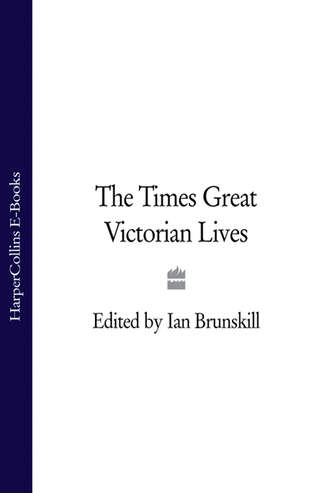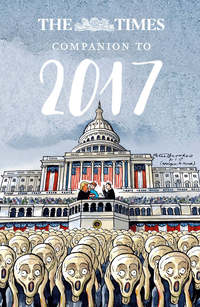
Полная версия
The Times Great Victorian Lives

The Times Great Victorian Lives
An Erain Obituaries
GENERAL EDITOR: IAN BRUNSKILL EDITED BY PROFESSOR ANDREW SANDERS

Table of Contents
Cover Page
Title Page
Introduction
Thomas Arnold
Felix Mendelssohn
George Stephenson
William Wordsworth
Sir Robert Peel
J. M. W. Turner, R. A.
Isambard Kingdom Brunel
Robert Stephenson
William Makepeace Thackeray
Nicholas, Cardinal Wiseman
Abraham Lincoln
Lord Palmerston
Michael Faraday
Charles Dickens
General Robert E. Lee
Charles Babbage, F. R. S.
Emperor Napoleon Iii
William Charles Macready
David Livingstone
John Stuart Mill
Sir Edwin Landseer
Harriet Martineau
Sir Titus Salt
William Henry Fox Talbot
Pope Pius Ix
George Gilbert Scott
John Thadeus Delane
George Eliot
Thomas Carlyle
Benjamin Disraeli, First Earl Of Beaconsfield
Dante Gabriel Rossetti
Charles Darwin
Anthony Trollope
Richard Wagner
Karl Marx
Victor Hugo
Sir Moses Montefiore
Franz Liszt
Matthew Arnold
George Charles Bingham, 3rd Earl Of Lucan
Wilkie Collins
Robert Browning
John Henry Newman
Charles Bradlaugh
Charles Stewart Parnell
Thomas Cook
Alfred Lord Tennyson
Louis (lajos) Kossuth
Robert Louis Stevenson
Christina Rossetti
T. H. Huxley
Friedrich Engels
Louis Pasteur
Lord Leighton
Clara Schumann
Sir John Everett Millais
William Morris
Johannes Brahms
Charles Lutwidge Dodgson (lewis Carroll)
William Ewart Gladstone
Sir Edward Burne-jones
Otto Von Bismarck
Helen Faucit
Henry Tate
John Ruskin
Sir Arthur Sullivan
Oscar Wilde
Dr Barnardo
Sir Henry Irving
Josephine Butler
Lord Kelvin
Florence Nightingale
Count Leo Tolstoy
W. S. Gilbert
Octavia Hill
W. G. Grace
Elizabeth Garrett Anderson
Sarah Bernhardt
Index
Copyright
About the Publisher
INTRODUCTION
Ian Brunskill
Obituaries Editor of The Times
By the middle of the 19th century, when the obituaries collected here began to appear, The Times was well on the way to becoming a British institution, secure in its values, confident of its position and proud of the influence it exercised in the world. That confidence and influence had been hard won. The London press, when The Times was founded (as the Daily Universal Register) in 1785, was notable as much for its venality as for anything else. In the rough and tumble of political life, newspapers and journals were there to fight a corner or settle a score. Precisely which corner or score was not always important, if the price was right.
The Times had dragged itself on to higher ground. Thomas Barnes, Editor from 1817 to his death in 1841, began to build the paper into a significant independent force in British politics. His successor, John Thadeus Delane, whose obituary is reprinted here, consolidated the work; at the height of his 36-year editorship, the paper’s prestige was considerable, its power much feared – and its support could not be bought.
In 1854 Delane gave a ringing summation of the paper’s understanding of its role. Attacked in Parliament by the Leader of the Opposition, he replied the next morning in a leading article: ‘We hold ourselves responsible, not to Lord Derby or the House of Lords, but to the people of England, for the accuracy and fitness of that which we think proper to publish…This journal never was, and we trust never will be, the journal of any Minister, and we place our own independence far above the highest marks of confidence that could be given us by any servant of the Crown.’
That defiant firmness of judgement and independence of thought lent significant weight to the paper’s obituary coverage. In an area where the risks of personal bias and parti-pris are great, Delane saw that The Times’s unique authority gave it a valuable advantage over less high-minded rivals. He determined to make the most of it, expanding the paper’s reporting of important deaths to the point where obituaries became an essential and enduring element of The Times’s editorial core. Other papers’ efforts came nowhere near.
Delane was aware that he lived in an age both fascinated by historical greatness and well stocked with remarkable personalities of its own. He saw that the demiseof a prominent national figure would capture the public imagination as nothing else could. It was worth covering in depth and, if necessary, at considerable length. The death of the Duke of Wellington, he told his deputy, ‘will be the only topic’.
Readers seemed to agree. Wellington’s obituary, all 47,000 words of it, dominated The Times over two days in September 1852; such was the demand that it was republished as a pamphlet for separate sale. Similarly, in 1865, when the paper’s circulation stood at 65,000, the publication of Palmerston’s obituary on 18 October added more than 11,000 copies to the daily sale.
In its early days, the paper’s approach to obituary coverage had been haphazard. Notable deaths had been recorded, from the French Revolution onwards, but there was no great consistency of quality or tone. If The Times found itself without an obituary of an important person who had died, it was not above plagiarism, or simply reprinting a notice from another publication (as it did with the life of General Lee, included here). All this changed under Delane. There was no attempt to be comprehensive, and nothing like the daily obituary column of modern times, but Delane made sure that The Times would rise to the big occasion in matchless style.
In doing so, he was able to call on the remarkable editorial team that he and his predecessor had assembled. Some of these ‘Men of The Times’ were to be found each night at ‘the office’ in Printing House Square, writing leading articles and editing reports; some wrote to order from Oxford and Cambridge colleges and country rectories; some were critics whose engagement showed the paper’s commitment to serious coverage of music, literature, theatre and the visual arts; some were diplomatic specialists, at home in Europe’s embassies; some were foreign correspondents in the field. Together with the Editor’s own contacts in the corridors of power, and those of the Walter family, hereditary ‘chief proprietors’ of The Times, they made up a formidable intelligence network, and among them were some formidable minds.
A leading role in the paper’s obituary coverage was for many years taken by Charles Dod, founder of Dod’s Parliamentary Companion and, as head of the Times gallery staff at Westminster, responsible for setting new standards in the reporting of parliamentary debates. After Dod’s death in 1855, much work on obituaries was done by the versatile Scottish man of letters Eneas Dallas; one of the paper’s most prolific book reviewers and author of a well-regarded study of poetry, The Gay Science, Dallas also volunteered to report from inside Paris when the French capital was under siege. Among the many obituary notices in which Dallas’s was the sole or principal hand were those of Dickens, Palmerston, the Austrian Chancellor Prince Metternich, Thackeray, the historian and politician Thomas Babington Macaulay, and Albert, the Prince Consort.
From 1868 much responsibility was taken by Edward Walford, antiquary, biographer and prolific author, a former Editor of the Gentleman’s Magazine and the compiler of such reference works as Hardwicke’s Titles of Courtesy and the Shilling Baronetage and Knightage. Obituaries of leading statesmen might be furnished by Henry Reeve, a hugely influential figure both at The Times and behind the scenes in political life; known by his Times colleagues, not entirely affectionately, as Il Pomposo, he had risen from humble beginnings to become an intimate of Government ministers and royalty. The Reverend Thomas Mozley – pupil, friend and brother-in-law to John Henry Newman and himself a participant in the Oxford Movement and the upheavals it wrought in the Victorian Church of England – was responsible for the lives of such leading Tractarians as John Keble and Edward Bouverie Pusey. W. H. Russell, the great foreign correspondent whose vivid dispatches from the Crimea brought home to the British public the realities of war, supplied obituaries of military men. Leonard Courtney, a leader writer who had read mathematics at Cambridge, wrote on scientists; Tom Taylor, the paper’s art critic, covered painters; Antonio Gallenga, a colourful Italian exile turned foreign correspondent, accounted for several of his compatriots.
It is only thanks to the paper’s meticulously kept archive and the published volumes of its official history that we can know now in such detail who did what. None of these authors received a byline. Anonymity was, and would long continue to be, the Times’s watchword. The self-effacing Thomas Barnes had his own death marked only by a two-line announcement which made no reference to the fact that he had, for 24 years, been Editor of The Times.
The Times obituaries were the paper’s verdict, not the individual author’s, however well-informed or personally distinguished he might be. Delane made sure of this. He was away when Palmerston died, but he instructed his deputy to retrieve the prepared obituary from ‘the little basket which hangs over the davenport in my breakfast room’-he had revised it himself at home in Searjants’ Inn.
Delane saw to it that most of the important notices were prepared well ahead of time, and regularly updated as required. There are tales – reassuring to a 21st-century obituary editor – of copy being frantically written in the office late at night, or even in the train up to town from Ramsgate, when the paper had for some reason been caught unprepared. On the whole, however, as I hope this collection confirms, the major obituaries published in the 19th-century Times were the products of authoritative inside knowledge, and of long and careful thought. Here are the lives of some of the leading figures of the 19th century as they were recorded and judged by one of the defining institutions of the age, a paper that, as a correspondent once remarked approvingly to Delane, contrived somehow or other to be ‘always in at the Death!’
Professor Andrew Sanders
Readers of this collection of Victorian obituaries will discover a series of reasoned, and often admirably critical, assessments of public lives. They were all written before the age of Hollywood stardom and the emergence of the cult of celebrity fostered by the popular media. Victorian obituarists and biographers who dealt with public achievements did not see it as their business to probe into the private circumstances of their subjects; nor did they suppose that their readers would be interested in them reporting issues that they probably assumed were little better than backstairs gossip. Theirs was an age when ‘A’ and ‘B’ lists of celebrities were still determined by Burke’s Peerage and the Almanach de Gotha, and when very few people outside princely houses were famous for merely being famous. Fashions were both worn and created exclusively by the upper classes, and ‘sport’ was still largely regarded as the genteel matter of hunting, shooting and fishing. W. G. Grace, a Bristol doctor by profession and a gentleman cricketer by calling, was essentially an admired amateur. The idea that Mrs Grace might somehow be a ‘celebrity’ merely by association with her husband’s sporting prowess would have seemed preposterous. This present selection of thoughtful obituaries offers a sample of the ‘innumerable biographies’ that Thomas Carlyle thought formed the essence of history. It serves to illuminate a range of cultural, social and political issues of the Victorian century by offering a select view of public life expressed in exclusively Victorian terms.
The first obituary reprinted in this present collection is that of Thomas Arnold, the headmaster of Rugby school and the fosterer of much of the earnestness that shaped Victorian Britain. Two years after his death, a substantial biography of Arnold was published by his former pupil, Arthur Stanley. It was a book that had achieved something of the status of a classic by the end of the century. The problem with Stanley’s life of Dr Arnold, and indeed with any piously uncritical Victorian biography, lies now in the fact that Arnold – together with three other ‘Eminent Victorians’-had been debunked by that slick master of innuendo, Lytton Strachey. Strachey’s Eminent Victorians first appeared in 1918 and, in the often cynical and disillusioned post-First World War world, it had an immediate appeal. Strachey knew that a military metaphor for his historical method was appropriate: he described how an ‘explorer of the past’ had now to ‘attack his subject in unexpectedplaces; he will fall upon the flank, or the rear; he will shoot a sudden, revealing searchlight into obscure recesses, hitherto undivined’. The achievements and reputations of Strachey’s four ‘eminent’ Victorians have long since recovered from his tactical assaults, but, since 1918, both the strategies and the ‘art’ of biography have undergone a radical shift. Twentieth and twenty-first century biographers are generally disinclined either to describe the heroism of earnestness or to overlook moral shortcomings and sexual peccadillos; they also tend to suffer neither fools nor would-be saints gladly.
It is, however, in the pre-Stracheyan context that we must both place and understand Victorian obituaries. Most obituarists, prompted by a sense of the historical significance of biography, readily recognised that the lives of their subjects had a social context. Nineteenth-century Britain had been required to redefine itself and its role models in order to cope with the changes brought about by industrialisation, urbanisation and an increase in literacy. As a ‘newspaper of record’, The Times acknowledged its responsibility in recording the impact of these social readjustments. As the readers of Carlyle’s On Heroes, Hero-Worship, and the Heroic in History realised, heroism had to be re-examined in the light of the idea of the self-made man; they would also have appreciated that the evolving concept of heroism in Victorian Britain could not remain an exclusively male prerogative. The first generation of Victorian women included professional writers of the first eminence, but it is significant that neither the Brontë sisters nor Charlotte’s biographer, Elizabeth Gaskell, were deemed worthy of an obituary notice in The Times. In the period after 1865, however, partly as a result of John Delane’s resolution to enhance the status of his newspaper, the lives and achievements of professional women, as opposed to the mere social prestige accorded to titled women, were to find their proper place in the The Times’s obituary columns.
From what was called ‘The Age of Reform’ onwards, new avenues of expression for both men and women were slowly broadening out. Some of the obituaries included in the present collection remind us of the opening up of government and its institutions to those who did not form part of the old Establishment: Benjamin Disraeli, born a Jew, not only rose to the highest political office, but he also made determined efforts to open up the House of Commons to those practising Jews who were unable to take the requisite Christian oath of allegiance to sit in the House. The campaigns in the 1880s of the avowed atheist, Charles Bradlaugh, mark a further shift away from the confessional narrowness which had defined the State at the beginning of the century. The issue of women’s suffrage (which seems to vex John Stuart Mill’s obituarist) was not to be resolved until after the Great War, but it is clear from the enterprise of Harriet Martineau, George Eliot and Elizabeth Garrett Anderson that social, educational and professional liberation for women were seen as the proper precursors to the achievement of full political rights.
It is significant too that a good number of the men and women commemorated in this volume were classic Victorian examples of what Samuel Smiles famously described as ‘Self-Help’. Smiles (1812-1904), who wrote a life of George Stephenson in 1857 and who would go on to publish Lives of the Engineers in 1867, first issued his bestselling Self-Help in 1859. Smiles saw the spirit of self-help as ‘the root of all genuine growth in the individual’, which constituted ‘the true source of national vigour and strength’, and his aim was to provide role models for a newly aspirant class of what the Victorians referred to as ‘mechanics’. This body of skilled working men was to form a vital part of the emergent lower middle class, who, once enfranchised from 1867 onwards, began to change the political balance of power. What Smiles recognised was that the true gentleman was manifest in all classes as the ‘honest, truthful, upright, polite, temperate, courageous, self-respecting and self-helping’ citizen. This was in marked contrast to the upper-class definition of gentlemanliness, but Smiles clearly struck a profound note in a society where national wealth substantially came from trade and manufacture rather than from land. Writers and artists as well as men of science, invention and commerce were the new heroes, and this is reflected in The Times. Although his obituarist did not know the true extent of Dickens’s rise from childhood adversity, the novelist had, by the time of his death, emerged as the quintessential product of Victorian social mobility fostered by the application of an innate genius; The Times also recognised the achievement of other notable meritocrats who had risen above the humble circumstances of their birth – men and women such as George Stephenson, Thomas Carlyle, Michael Faraday, David Livingstone, George Eliot and Thomas Cook. Its 19-century obituary columns also honoured the philanthropical energy of men who had either made their money as enterprising manufacturers (Sir Titus Salt) or as City business men (Sir Moses Montefiore).
Victorian society was, however, far from class-less. Britain’s traditional ruling class remained entrenched and The Times remained duly deferential to those who had been born great. Its obituary of Queen Victoria herself (arguably the most influential woman of her generation) is so substantial and detailed that its very length precludes its inclusion in such a selection as this. The Queen’s tastes, antipathies and patronage are nonetheless evident in many of the other obituaries reprinted in this collection. This is equally true of Prince Albert, whose untimely death in 1861 occasioned lengthy and adulatory tributes, which often skirted over the widespread unpopularity Albert had experienced earlier in his life, and whose obituary notice is not included here. To give a full flavour of each person’s life and of the period, each obituary has been included here in its entirety, though they vary hugely in length. In order to include as wide and representative a selection as possible in the space available, it has been necessary to omit some fulsome tributes paid to others – from members of the Royal Family, to the upper clergy of the Church of England, Oxbridge dons, admirals and generals and lawyers and medical men who seem to posterity not to have made such a lasting contribution to the advancement of their professions. One celebrated British army officer, Lord Lucan, is included for the part he played in the debâcle of the Charge of the Light Brigade; he also forms part of a loosely linked group of obituary subjects (Delane, Tennyson and Florence Nightingale) who all share a connection with The Times’s critical reporting of the Crimean War. It has proved impossible, again due to its length, to include the death notice of the greatest soldier of the century, the Duke of Wellington, who died in 1852. Wellington’s career, both as a soldier and as a politician, also substantially fell outside the Victorian age, but his great funeral procession through London was perhaps the most memorable state occasion of the period. One great military figure remembered here, Robert E. Lee, ended his days regarded as an ignominious figure by a good many of his fellow Americans. His rehabilitation as a man of honour and a great strategist may have begun with the kind of posthumous tribute of which The Times’s is a fine example.
Four Prime Ministers, all of them accorded very long obituaries in The Times, firmly merit inclusion here: Peel, Palmerston, Disraeli and Gladstone all made profound contributions to the history of parliamentary government in the United Kingdom. Each of them also extended Britain’s international influence and resolutely established the country as, for the most part, a highly respected European power-broker. The substance of the political careers of all four would probably demand tributes of a similar expansiveness nowadays. So might the lives of a number of foreign heads of state, or heads of government. Abraham Lincoln’s assassination, which so appalled his contemporaries on both sides of the Atlantic, did not occasion what could strictly be described as an obituary, but The Times’s reporting of the event captures something of its immediate impact and perceived long-term import. Though it is not included here, the shocked telling of the assassination of Tsar Alexander II is comparable, and an account that suggests how alien Russian affairs may have seemed to British readers of The Times in 1881. The former Emperor Napoleon III received a surprisingly generous obituary notice, despite the fact that he had so often been dismissed by the British press as a charlatan during his reign, while his arch enemy, Otto von Bismarck, the Chancellor of the new German Empire which he had forged into existence, earns the extraordinarily flattering compliment that he was ‘one of the rare men who leave indelible marks on the world’s history’. Pope Pius IX’s demise in 1878 might well have elicited a similar adulatory comment, but his obituary dwells instead on the Pontiff’s manifest disappointments, diplomatic shortcomings and political failures, as much as on the great changes he both wrought and witnessed in the Roman Catholic Church.
When it came to foreign politicians and revolutionaries who spent their lives in exile The Times obituarists are far more guarded and ambiguous in their opinions. As the death notice of Lajos Kossuth implies, here was a man past his political peak. Kossuth, with Mazzini and Garibaldi, had been much admired by mid-century British liberals, and his obituary – representative of all three – demonstrates the combination of political inconsistency, frustrated energy and old-age compromise, common enough characteristics in unfulfilled politicians, that appeared to disconcert the three obituarists. It will probably surprise modern readers that both Karl Marx and Friedrich Engels receive such short shrift from their obituarists (the tribute to Marx, who died in London, was actually contributed by the paper’s Paris correspondent). Both men were long-term residents in England and both were familiar to a tight-knit international community of socialist thinkers but neither, The Times seems to suggest, possessed much immediate relevance to an exclusively British political world view. The fact that the major theoretical works of both had, at the time of their deaths, yet to appear in articulate English translations may well have contributed to this feeling of relative indifference.





